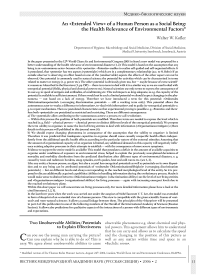An «extended view» of a human person as a social being: the health relevance of environmental factors
Автор: Kofler Walter W.
Журнал: Вестник Международной академии наук (Русская секция) @vestnik-rsias
Рубрика: Медико-биологические науки
Статья в выпуске: 2, 2006 года.
Бесплатный доступ
In the paper presented to the 12th World Clean Air and Environmental Congress 2001 in Seoul a new model was proposed for a better understanding of the health relevance of environmental disasters (1, 2): This model is based on the assumption that any being is an «autonomous actor» because of its «potentia». «Potentia» enables to realise self guided and self organised effects. It is postulated, that «potentia» has two aspects («potentials») which are in a complementary relationship (acc. to N. Bohr): If an outside observer is observing an effect based on one of the (unobservable) aspects the effects of the other aspect can not be observed. One potential is commonly used in natural science: the potential for activities which can be characterised in terms related to matter or energy (e. g. power etc). The other potential is obviously given too, but - maybe because of extra-scientific reasons as I described in the literature (3, pp 15ff) - there is no term to deal with it in a similar way as we are used to deal with energetical potential (fields, physical and chemical powers etc). Natural scientists use only terms to express the consequence of its use: e.g. to speak of antigens and antibodies, of conditioning etc. This technique is as long adequate, as e.g. the capacity of the potential is available in sufficient amount. If there would not be such a limited potential we should expect changings in the phenomena - not based on a lack of energy. Therefore we have introduced a term for this potential: «Ordnendes Diskriminationspotential» («arranging discrimination potential» - still a working term only). This potential allows the autonomous actor to «make a difference to information», to «deal with information» and to guide its «energetical potentials» e. g. to repair mechanisms. Then we postulated characteristics so that experimental proving is possible: e. g. «Potentia» and therefore both «potentials» are postulated as restricted and restricting. There are different consequences: a) The «potentials» allow attributing to the «autonomous actors» a process we call «evolution». - Within this process the qualities of both potentials are modified. Therefore terms are needed to express the level which is reached (e. g. field - physical powers - chemical powers to distinct different levels of the energetical potential). We propose the term «ability to organise» to name the level of living entities to deal with information («Organisationsvermögen»). (More details to this process will published in this journal soon (4). b) We should expect changing phenomena in consequence of the assumption that the «ability to organise» is limited: Therefore it was predicted that inadequate capacities to organise should cause causally unspecific health effects independently from the additional specific health effects according to the particular nature of the external stimulus: Assuming that the amount of organisational capacity of an organism is limited, any additional demand on this capacity will negatively influence existing adaptive processes in their attempts to establish - with the consequence of more severe symptoms.
Короткий адрес: https://sciup.org/14315082
IDR: 14315082
Список литературы An «extended view» of a human person as a social being: the health relevance of environmental factors
- Kofler W., Lercher P., Puritscher M. The need for sufficiently taking into account unspecific effects in the understanding of health risks, Part 1, 2 and 3. -12th World Clean Air and Environment Conference, Seoul, 2001.
- Kofler W., Lercher P., Puritscher M. Causally unspecific Health Risks of envi$ ronmental incidents, revised version of (1) for Nobel Laureate Y. T. Lee, Part 1: Unexplained phenomena, part 2: Epistemological limitations of the con$ ventional view and empirical proof of the extended view Part 3: A crucial experiment in support of the proposed solution, 2001.
- Kofler W. The relevance of Sechenov for the development of the theory of an extended view of a human person as a social being: Sechenov Honour Lecture, Russian Academy of Science et al (eds.), p 15 ff, Moscow, 2005.
- Witte D. et al. Cardiovascular mortality in Dutch men during 1996 European football championship: longitudinal population study. BMJ, 2000. 321, 1552-1554.
- Kofler W. Health effects of Environmental Disasters and the need of a more complex model of man, Y. Steinberg (ed.) Preservation of Our World in the Wake of Change, Vol. VI AB, ISEEQS Publ., Jerusalem, Israel, 1996. 275-282.
- Stewart A., Kneale G. A$Bomb survivors: factors that may lead to a re$assess$ ment of the radiation hazard. Int. Journal Epidemiology, 2000, 29, 708-714.
- Popper K. R. Logic of Scientific Discovery, deutsche Ausgabe, 10. Auflage, Mohr (Paul Siebeck), Tünbingen1994.
- Kirkup W., Merrick D. W. A matter of life and death: population mortality and football results. J. epidemiol Community Health, 2003: 57: 429-432.
- Kofler W., Wagner M., Paduch M., Mannebeck H. On combinatory effects of subjective stimulants and physical and chemical loads, Int. Union of Air Pollution and Environmental Protection Associations (ed.) The interface between developing and developed Countries, -NACA, Parklands, 1998: Vol. 2, 7G2


